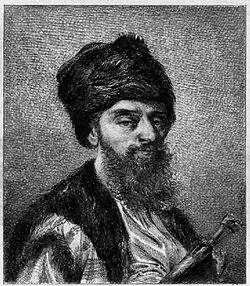Constantine Ypsilantis
| Constantine Ypsilantis | |
|---|---|

Prince Constantine Ypsilantis
|
|
| Born |
Constantine Ypsilantis 1760 Constantinople, Ottoman Empire |
| Died | 24 June 1816 Kiev, Russian Empire |
| Nationality | Moldavian |
| Known for | Prince of Moldavia |
| Title | Prince |
| Term | 1799–1801 and 1802–1806 |
| Predecessor | Alexandru Callimachi |
| Successor | Alexandru Şuţu |
| Spouse(s) | Ralu Callimachi |
| Children | Alexander Ypsilantis, Demetrios Ypsilantis. |
| Parent(s) | Alexander Ypsilantis |
| Relatives | Alexandru Callimachi, father-in-law |
Constantine Ypsilantis (Greek: Κωνσταντίνος Υψηλάντης, Konstantinos Ypsilantis; Romanian: Constantin Ipsilanti; 1760–1816), was the son of Alexander Ypsilanti, a key member of an important Phanariote family, Grand dragoman of the Porte (1796–99), hospodar of Moldavia (1799–1802) and Walachia (1802–06), and a Prince through marriage to the daughter of Alexandru Callimachi.
Ypsilantis had joined in a conspiracy to liberate Greece and, on its discovery, fled to Vienna, had been pardoned by the sultan and in 1799 appointed by him hospodar of Moldavia. Deposed in 1805, he escaped to St Petersburg, and in 1806, at the head of some 20,000 Russians, returned to Bucharest, where he set to work on a fresh attempt to liberate Greece.
From 1806, during Russian occupation of the Principalities of Moldavia and Wallachia, Russia encouraged their provisional union under Prince Constantine Ypsilanti. Russia preferred their union for improved relations with the Principalities and their formal union was planned for 1830.
Ypsilantis' plans were ruined by the peace of Tilsit and in 1807 he emigrated with his family to Russia.
Ypsilantis died, in Kiev, where he had served as commandant of the Pechersk Fortress since 1807. He left five sons, of whom two played a conspicuous part in the Greek War of Independence: Alexander and Demetrios.
...
Wikipedia
